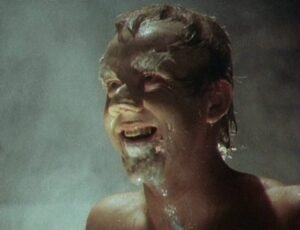In the realm of cinematic folk horror three films are enshrined as ‘the unholy trinity’, The Wicker Man, The Witchfinder General, and The Blood on Satan’s Claw. Of the films only The Wicker Man has a contemporary (at the time of production) setting with the other two set in historical times.The Witchfinder General is set during the English civil war and while no magical or supernatural events takes place it is a film with characters obsessed with witchcraft. The movie I watched this past Sunday night The Blood on Satan’s Claw takes place in the early 1800’s when the enlightenment, for the educated, has dispelled superstition but unlike The Witchfinder General, here the supernatural is real and evil stalks the land.
Originally conceived as an anthology film The Blood on Satan’s Claw kicks off with a country lad discovering inhuman remains in a field he was tilling. The educated judge visiting the isolated  village dismisses any talk of demons as superstition leaving the villagers to face the growing threat alone. The children of the village fall under the thrall of some unseen influence bringing death and terror to the adults and children resistant to the unholy call.
village dismisses any talk of demons as superstition leaving the villagers to face the growing threat alone. The children of the village fall under the thrall of some unseen influence bringing death and terror to the adults and children resistant to the unholy call.
While lacking in the gory effects made popular in the 80s cycle of horror films and not quite up to the standard of psychologically themed horror films, The Blood on Satan’s Claw, though not a massive hit in its time, has come to be seen as one of the founding films, along with the others in the unholy trinity, of the genre folk horror. What makes this movie effect as a horror film is that apparent randomness of the violence and misfortune that befalls various villagers. There is no ‘transgress and die’ pattern at work nor are the people targeted a direct danger to the growing evil. Terrible fates fall upon characters without reason leaving an existential dread in the air that anyone at any time is a potential victim.
Perhaps slow by today’s standards The Blood on Satan’s Claw is still worth a watch and is currently streaming on Shudder.

